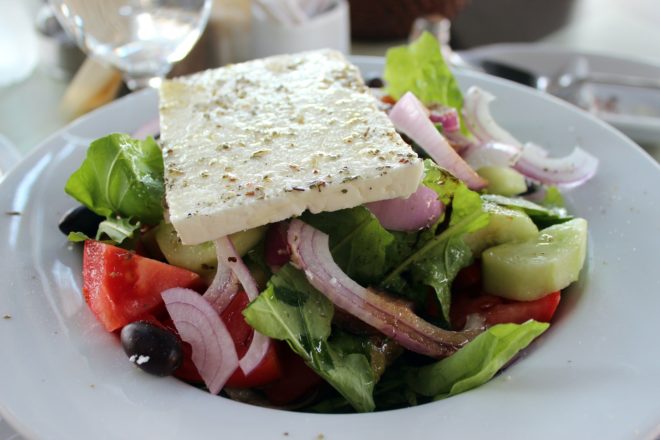The Mediterranean conjures up images of blue skies, sandy beaches, fishing boats bobbing in the clear waters, white washed houses, blue domed churches, olive groves, vines growing over trellis.
Sun shine on the face, fresh air. People in tavernas sharing the meals with family and friends. Eating fresh food matters to the Mediterranean cultures as much as does sharing the meals with family and friends.
Mediterranean food tastes good, of course, but it also embodies an enjoyable lifestyle. People in the Mediterranean have a reputation for enjoying life and not taking things too seriously. This means less self-inflicted stress.
Enjoy the traditional Mediterranean lifestyle a perfect balance between work and leisure, family, and food. Consider adopting the traditional Mediterranean Diet. This diet is considered the world’s healthiest diet.
The traditional Mediterranean diet is based on preparing fresh, seasonal foods. It is abundant in fruits, vegetables, whole grains, legumes a sprinkling of olive oil, herbs, and spices.
It features fish and poultry, lean sources of protein, over red meat, which contains more saturated fat. Red wine is consumed regularly but in moderate amounts.
According, to research by Sofi F. et al. (2008) “Greater adherence to a Mediterranean diet is associated with a significant improvement in health status, as seen by a significant reduction in overall mortality (9%), mortality from cardiovascular diseases (9%), incidence of or mortality from cancer (6%), and incidence of Parkinson’s disease and Alzheimer’s disease (13%).
“These results seem to be clinically relevant for public health, in particular for encouraging a Mediterranean-like dietary pattern for primary prevention of major chronic diseases.”
Eating a Mediterranean diet has also been associated with reduced levels of inflammation, a risk factor for heart attack, stroke, and Alzheimer’s disease. According, to research by Hu EA et.al (2013)
“The traditional Mediterranean dietary pattern (MedDiet) is associated with longevity and low rates of cardiovascular disease (CVD).”
With all of the positives of a Mediterranean diet you too can follow it, even if you live nowhere near a Greek island by incorporating the following in meal planning.
Vegetables
The Mediterranean traditional meals are vegetable casseroles, stews, and side dishes. Vegetables common to the traditional Mediterranean Diet include: artichokes, arugula, beetroots, broccoli, Brussels sprouts, cabbage, carrots, celery, celeriac, chicory,
collard greens, cucumbers, dandelion greens, green beans, eggplant, fennel, kale, leeks, lemons, lettuce, mushrooms, mustard greens, nettles, okra, onions (red, sweet, white), peas, peppers, potatoes, pumpkin, purslane, radishes, rutabaga, scallions, shallots,
spinach, sweet potatoes, turnips, and zucchini. They are prepared with tomato, onion, garlic, and various herbs and spices, consumed as a main dish together with feta cheese and bread.
Salads are always seasonal from the Greek salad in the summer in the winter cabbage with carrot or seasonal wild greens, boiled and consumed with olive oil, lemon, feta cheese, and bread. Vegetable pies were also popular traditionally.
They include spinach pies, cheese pies, leek pies, pumpkin pies. Incorporate them in to meals at least once a week.
Vegetables are high in vitamins, minerals, energy, antioxidants, and fibre promotes optimal health and weight control. Eat vegetables with every meal.
Legumes
Legumes were the main source of proteins in the traditional Mediterranean diet. Legumes were consumed a few times a week.
Beans such as chickpeas, broad beans, fava beans, butter beans, lentils are prepared with tomato, onion, and olive oil, and accompanied with cheese and bread. Include at least two to three legumes meals (250g serve) per week.
Fish
Fish is eaten on a regular basis in the traditional Mediterranean diet.
Fish such as tuna, herring, mackerel, salmon, and sardines are rich in omega-3 fatty acids, and shellfish including mussels, oysters, shrimp, crab and clams have similar benefits for brain and heart health. Eat at least two servings of fish (150-200g serves) per week.
Meat
Traditionally meat was not consumed very often, usually only during celebrations. Popular choices include lamb, goat, chicken, pork, and veal.
Traditionally meat is usually prepared roasted in the oven with lemon, garlic, and oregano, or as a stew in tomato sauce. Meat is almost always accompanied by roasted potatoes. Eat smaller portions of meat less often (no more than once or twice a week).
Bread
Bread is present at every single meal. An alternative to bread is the Rusk (paximadi), which originally was old bread baked. Include whole grain breads with meals (aim for 3-4 slices of bread per day);
Dairy
Dairy was mainly consumed in the form of cheese and yogurt. Fabulous feta cheese or mizithra accompanies almost every dish. Eat yoghurt everyday (about 200g) and cheese in moderation about 30 to 40 grams per day.
Olives
Olives are a very important staple food in the traditional Mediterranean diet. Olives have sustained farmers, shepherds through the ages.
To this day, olives, together with bread or rusks and a little cheese, comprise an important part of the traditional Greek farmer’s midday snack eaten in the field.
Olives are packed with delicious nourishing Vitamins E, D, K and A, monounsaturated fats which may reduce risks of heart and cardiovascular disease.
Olives, like olive oil, contain phenolic compounds, which are natural antioxidants. Eat 1-2 servings of olives every day.
Fruits
Fruits were also consumed as a snack or after a meal fresh in summer and dried in winter. Fruits common to the traditional Mediterranean Diet include: apples, apricots, avocados, cherries, clementines, dates, figs, grapefruits, grapes, melons, nectarines, olives, oranges, peaches, pears, pomegranates, strawberries, tangerines, and tomatoes.
Eat a wide range of delicious fresh fruits every day.
Nuts
Nuts are bursting with goodness. A handful of nuts and seeds, such as almonds, walnuts, pistachios, pumpkin seeds, and sesame seeds, can add flavour and healthy fats, protein, and fibre to the diet. Incorporate nuts and seeds in the diet 1-2 servings every day.
Grains
Incorporated traditional Mediterranean grains like bulgur, buckwheat, couscous, barley, farro, polenta, rice, and pasta.
Fats
Olive oil is a main fat ingredient in the Mediterranean diet. It is used in cooked dishes from casseroles to meat to salads as well as desserts. Olive oil contains oleic acid and phenolic and monounsaturated fats reduce the risk of heart disease.
The phenolic compounds of olive oil, has strong anti-inflammatory properties. In the study conducted by Estruch R et.al (2013) a Mediterranean diet supplemented with extra-virgin olive oil or nuts reduced the incidence of major cardiovascular events.
According, to the ACS Chemical Neuroscience journal (2013) “Oleocanthal, a phenolic component of extra-virgin olive oil, has been recently linked to reduced risk of Alzheimer’s disease.” Incorporate olive oil as the main added fat in the meals around 60 mls a day.
Alcohol
Enjoy red wine in moderation. The standard measurement of wine consumption is the following: 2 glasses for males per day, 1 glass for females per day, always with meals. Have a few alcohol-free days a week.
Drink Water
Drink plenty of quality filtered water each day, to stay hydrated. About 6 to 8 glasses a day.
Desserts
Traditional Mediterranean diet desserts include spoon fruit preserves, olive oil based biscuits and cakes. Eat desserts a few times a week.
In conclusion, the Mediterranean Diet contains all the essential nutrients required for good health. A large part of the Mediterranean lifestyle is simply savour the experience of meals. Experience the joy the Mediterranean Diet lifestyle will bring to you and your family.
You can find much more information on living a holistic lifestyle in these free magazines and on our YouTube channel.
 Irene Vervliet – Naturopathic Doctor
Irene Vervliet – Naturopathic Doctor
References
- American Heart Association. Heart and Stroke Statistical Update. Dallas, Tex: American Heart Association; 1998
- de Lorgeril M, Salen P, Martin JL, et al. Mediterranean diet, traditional risk factors, and the rate of cardiovascular complications after myocardial infarction: final report of the Lyon Diet Heart Study. Circulation. 1999;99:779-785
- Estruch R, Ros E, Salas-Salvado J, et al; Primary prevention of cardiovascular disease with a Mediterranean diet. N Engl J Med. 2013 Apr 4 368(14):1279-90. doi: 10.1056/NEJMoa1200303. Epub 2013 Feb 25.
- Hardman RJ, et al. Adherence to a Mediterranean-Style Diet and Effects on Cognition in Adults: A Qualitative Evaluation and Systematic Review of Longitudinal and Prospective Trials. Frontiers in Nutrition. 2016.
- Hu EA, Toledo E, Diez-Espino J, et al; Lifestyles and Risk Factors Associated with Adherence to the Mediterranean Diet: A Baseline Assessment of the PREDIMED Trial. PLoS One. 2013 Apr 29 8(4):e60166. doi: 10.1371/journal.pone.0060166. Print 2013.
- Mayo Clinic “Nutrition and healthy eating”’ 2017, accessed 2/2/2017, http://www.mayoclinic.org/healthy-lifestyle/nutrition-and-healthy-eating/in-depth/mediterranean-diet/art-20047801?pg=2
- Menendez JA, Lupu R. Mediterranean dietary traditions for the molecular treatment of human cancer: anti-oncogenic actions of the main olive oil’s monounsaturated fatty acid oleic acid (18:1n-9). Curr Pharm Biotechnol. 2006 Dec;7(6):495-502.
- Patient, “Mediterranean-diet”, accessed 1/2/207 http://patient.info/health/mediterranean-diet
- Oldways 2016, Mediterranean Diet, Oldways traditional diets, accessed 3/2/2017.
- Romero C, Medina E, Vargas J, Brenes M, De CA. In vitro activity of olive oil polyphenols against Helicobacter pylori. J Agric Food Chem. 2007 Feb 7;55(3):680-6.
- Sofi F, Cesari F, Abbate R, et al; Adherence to Mediterranean diet and health status: meta-analysis. BMJ. 2008 Sep 11 337:a1344. doi: 10.1136/bmj.a1344.
- Martinez-Gonzalez MA, de la Fuente-Arrillaga C, Nunez-Cordoba JM, et al; Adherence to Mediterranean diet and risk of developing diabetes: prospective cohort study. BMJ. 2008 Jun 14 336(7657):1348-51. Epub 2008 May 29.
- The Mediterranean Diet Foundation, 2017 http://dietamediterranea.com/en/
- The ACS Chemical Neuroscience journal, 2013, http://pubs.acs.org/doi/abs/10.1021/cn400024q
- Yang J, Farioli A, Korre M, N. Kales SN February 4, 2014, ‘Modified Mediterranean Diet Score and Cardiovascular Risk in a North American Working Population’ http://dx.doi.org/10.1371/journal.pone.0087539






